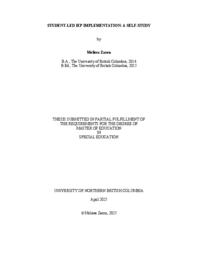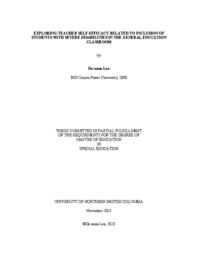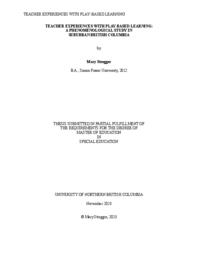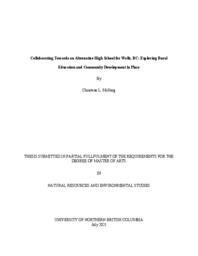Banack, Hart
Person Preferred Name
Hart Banack
Related Works
Content type
Digital Document
Description / Synopsis
The benefits of inclusive classroom practice have been well documented. Proponents of inclusive education continue to encourage teachers to implement universal design practices that will support all learners, not just those with special learning needs. The purpose of this qualitative study was to investigate the feelings of self-efficacy of a small group of general education classroom teachers located in Northwestern British Columbia. The study focused on how prepared teachers felt to implement inclusive practices to meet the learning needs of students with severe disabilities in their general education classrooms. Through a qualitative research case study approach, using purposeful sampling, the researcher recruited five general education classroom teachers all working within the same Northwestern British Columbia school district. The researcher aimed to work with the participants to gather suggestions or find common themes where teachers felt they needed more support or training around inclusion. Data was collected through a series of semi-structured, one-on-one interviews with participants chosen from a single Northwestern British Columbia school district. Interviews lasted between 16 and 35 minutes. Data was analyzed using Saldaña’s (2013) general coding process, beginning with First Cycle coding that included Attribute, Descriptive, NVivo, and Values coding. The researcher utilized Pattern Coding during the Second Cycle coding process and compiled the findings using a clear framework for data collection, and the use of multiple participant views. My UNBC thesis supervisor monitored the data collection and interview processes to ensure it was conducted appropriately and that the researcher coded the data with consistency. Findings included the need for more hands-on practice and training in specific Special Education practices, the importance of having support staff trained in Special Education as well as intensive behaviour support, clear communication between school teams, within districts and with parents, as well as possible changes in funding models to address class size, composition, increase access to diagnostic assessments.
Origin Information
Content type
Digital Document
Description / Synopsis
In Surrey, British Columbia teachers use play-based learning to support young students under the guidance of the provincial curriculum including language diverse settings. This qualitative phenomenological research study investigated teacher experiences with implementing play-based learning for English language learner support in kindergarten and Grade 1 classrooms. All participants were employed by the Surrey school district during the research study. Six participants completed interviews and another six completed digital surveys that were used for complementarity. Interview and survey transcripts were coded with a Vygotskian theoretical lens and five themes were developed: teaching philosophies and practices, school experiences, literacy, play, and English Language Learning. Conclusions included teachers defined play-based learning in different ways; teachers noticed positive impacts of play on ELL students; teachers used two distinct play-based strategies for supporting ELL students; and the pandemic had negative impacts on teachers, their students, and student caregivers. Recommendations for teachers of ELL students included getting directly involved in play, teaching play strategies explicitly, and employing teaching strategies that incorporated language usage and play including the story workshop method and free play.
Origin Information
Content type
Digital Document
Description / Synopsis
Rural high schools are often the heart of rural towns, as they can have significant social, cultural, and environmental contributions to community life. The absence of a high school can impact students' mental, physical, and social health and the entire community's social and economic well-being. This research used Community-Based Participatory Research to examine rural education and community development processes using place-responsive approaches in the rural town of Wells, BC. Wells is a unique, dynamic, artsy community in the BC interior and does not currently have a high school. Results suggested that a lack of a high school in Wells had reverberating social and economic effects on individual and community life. Understanding these effects can allow community members to target unique opportunities that counter impacts. Community approaches to alternative education integrated place-responsive, community-, outdoor, and art-based education that reflected community values. These values can be incorporated into educational models and programs to respond to context-specific community desires and needs. Research results can be referred to when determining future directions for local education in Wells and inform more global applications of educational and rural place-based community development policy and practices.
Origin Information




